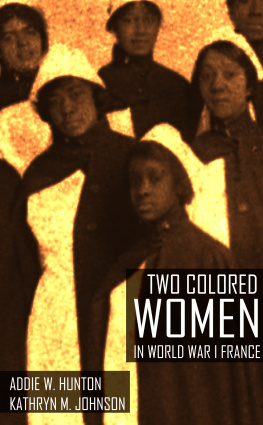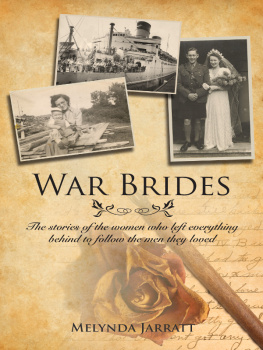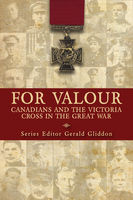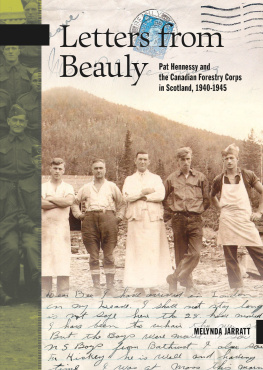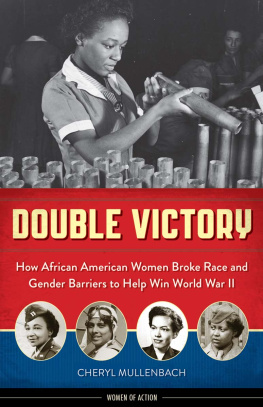Women Overseas

Women Overseas
Memoirs of the Canadian Red Cross Corps
(Overseas Detachment)
edited by
Frances Martin Day,
Phyllis Spence
& Barbara Ladouceur

WOMEN OVERSEAS: MEMOIRS OF THE CANADIAN RED CROSS CORPS
Copyright 1998 Frances Martin Day, Phyllis Spence, Barbara Ladouceur
All rights reserved. No part of this publication may be reproduced, stored in a retrieval system, or transmitted, in any form or by any means, without prior written permission of the publisher, or, in Canada, in the case of photocopying or other reprographic copying, a licence from CANCOPY (Canadian Copyright Licensing Agency), 900 6 Adelaide Street East, Toronto, ON, M5C 1H6.
RONSDALE PRESS LTD.
3350 West 21st Avenue
Vancouver, B.C., Canada
V6S 1G7
Set in New Baskerville: 11 pt on 14
Typesetting: Julie Cochrane
Printing: Hignell Printing, Winnipeg, Manitoba
Cover Design: Julie Cochrane
Cover Art: Voluntary Aid Detachment WW II poster (courtesy of the Canadian Red Cross)
Frontispiece: Catherine MacDonald Waters
Ronsdale Press wishes to thank the Canada Council for the Arts, the Department of Heritage, and the British Columbia Cultural Services Branch for their support of its publishing program.
CANADIAN CATALOGUING IN PUBLICATION DATA
Women overseas
Includes bibliographical references and index.
ISBN 0-921870-61-2
1. World War, 19391945War workRed Cross. 2. World War, 19391945Personal narratives, Canadian. 3. World War, 19391945Participation, Female. 4. Korean War, 19501953War workRed Cross. 5. Korean War, 19501953Personal narratives, Canadian. 6. Korean War, 19501953Participation, Female. 7. Canadian Red Cross SocietyBiography. 8. NursesCanadaBiography. I. Day, Frances Martin, (date) II. Spence, Phyllis, 1943 III. Ladouceur, Barbara, 1949D807.C2W65 1998 940.54'771'092271 C98910864-3
DEDICATION
Here at the fondly remembered
(now mythical) Strollers Club, we propose
a toast to all the 641 dear friends and companions
of the Canadian Red Cross Corps
for the laughter, tears and total involvement
during the war years.
ACKNOWLEDGEMENTS
This book could not have become a reality without the encouragement and assistance of many people. We are especially grateful to Phyllis Elder Matheson, Past President of the Overseas Club, Victoria, for her ongoing support and invaluable historical knowledge; Jane Rogers, President of the Overseas Club, Victoria, for her belief in the historical importance of the stories in Women Overseas; Jean Hill, Overseas Club Archivist, for graciously helping us to locate Canadian Red Cross Corps photographs; Ann M. Butryn, Manager, Office Services/Librarian of the Canadian Red Cross, for providing her expertise and arranging for permission to use the World War II Red Cross poster on the cover of Women Overseas; and Marjorie Andrew, National President of the Overseas Club, for her help in verifying historical details.
We deeply appreciate the ongoing support of our families and friends, their interest, understanding and help in preparing the manuscript. Our heartfelt thanks also to Ronald and Veronica Hatch for sensitively and skillfully leading their troops of editors and Canadian Red Cross Corps members through the exciting journey that this project has involved.
Most importantly, we give a standing ovation to the members of the Vancouver Island Overseas Club who shared their compelling stories with us. We thank them for their wholehearted support in inviting us to their meetings, welcoming us into their homes and lending us their photographs and mementoes.
CONTENTS
Rocket shells swished upwards, tearing the night apart like a giant hand tearing silk
I decided to gothere was a war to be won
We sat and shivered in the pitch dark railway station
I had never made pastry, but I did have my trusty cookbook
Lots of laughing, some crying, but everyone pulled her weight
Down the shaky rope ladder we went
The whole side of my ambulance came off
My God, what are you doing here, Porky?
I wondered if I would ever see him alive again
Sunny Italy wasnt warm or sunny
We forged a bond that you can't break
Everyone on those war bride trains was precious cargo
I felt sure we were climbing Mount Everest
We were all proud of being Canadian
You know this is the end of the line
His spirit was wonderful and I never felt I could do enough for him
We found the drivers very protective of us
The air became electric and tense with excitement
It was awesome to see all those ships
I will never, never forget those pictures
I shall never forget seeing thousands of bombers
It was a little oasis for the war brides
Then the dreaded route marches started
You have to be a good sailor
The celebrating and rejoicings were unbelievable
You people in the Red Cross saved our lives
I was ready for anything, or so I thought
It was quite magical, and possibly dangerous
My year in Japan and Korea was an incredible, unforgettable experience
Quite suddenly I was whisked off to Korea
It changed my life forever
FOREWORD
In Women Overseas, thirty-one members of the Canadian Red Cross Corps recall their experiences as overseas volunteers during World War II and the Korean War. Most of these women came of age in the midst of war and all of them rose bravely to the challenge of overseas service.
Love for their country and in many cases love for their men who were already serving overseas were often the driving forces that motivated women to leave the relative safety of Canada to accept Red Cross postings in war-torn England, continental Europe and Asia. Through these vivid narratives we learn how it feels to cross U-boat infested oceans, to survive daily bombings and severe food shortages, to witness death and destruction, and to acquire the carpe diem spirit and courage exhibited by so many ordinary people during war. We hear the voices of the Red Cross Corps sing O Canada and The Maple Leaf Forever when they first land in England and then again in France to join the soldiers who preceded them. We listen to the cheers of the French people and Canadian soldiers as the Red Cross Corps members travel along the Maple Leaf Up, the main highway from Normandy to Germany during World War II. We visit the Maple Leaf Clubs in London where thousands of Canadian soldiers enjoyed a taste of home on their leaves from the war. We learn that the maple leaf was a proud symbol of Canadian courage and solidarity decades before it first appeared on our flag. After reading these stories, the Canadian flag with its large red maple leaf proudly recalls the courage of those who died for the peace that Canadians have enjoyed for over five decades.
While the red maple leaf signifies Canadian nationality, the red cross symbolizes an international organization that comes to the aid of all nations. The concept of the Red Cross was created in the midst of war. In 1859, Jean Henri Dunant, a Swiss businessman, happened to be travelling in Italy when he arrived in Solferino in time to witness the aftermath of a battle between the armies of Austria and Napoleon III. He organized volunteers to set up emergency hospitals for the wounded soldiers of both armies. In 1862, Dunants book
Next page

